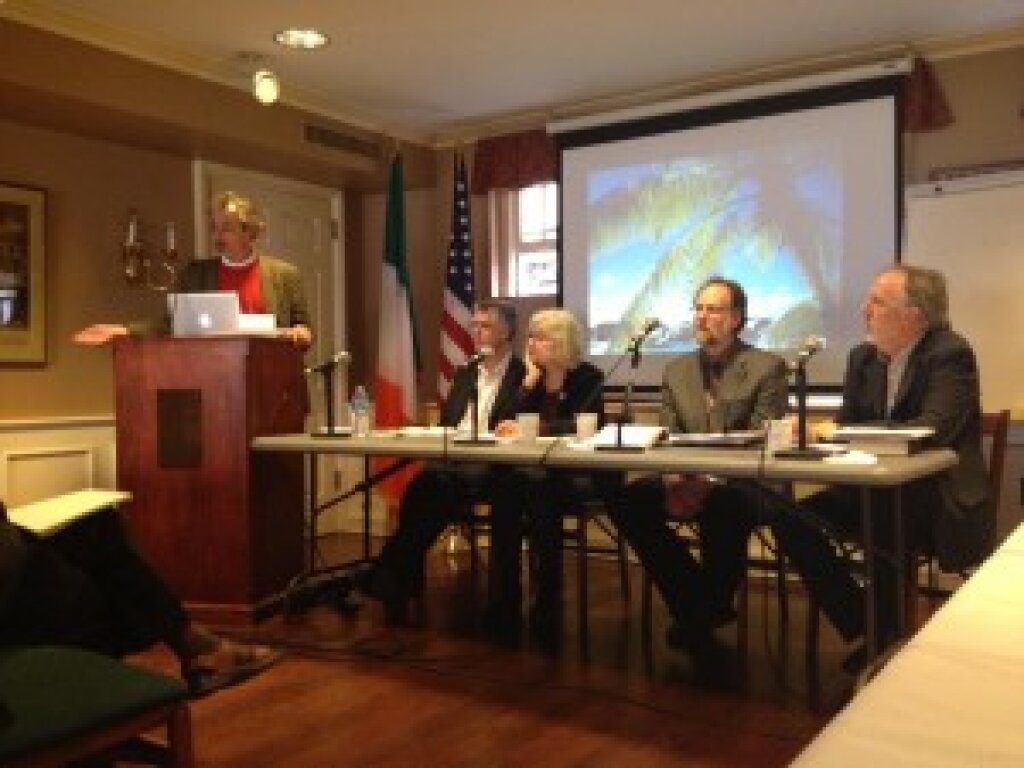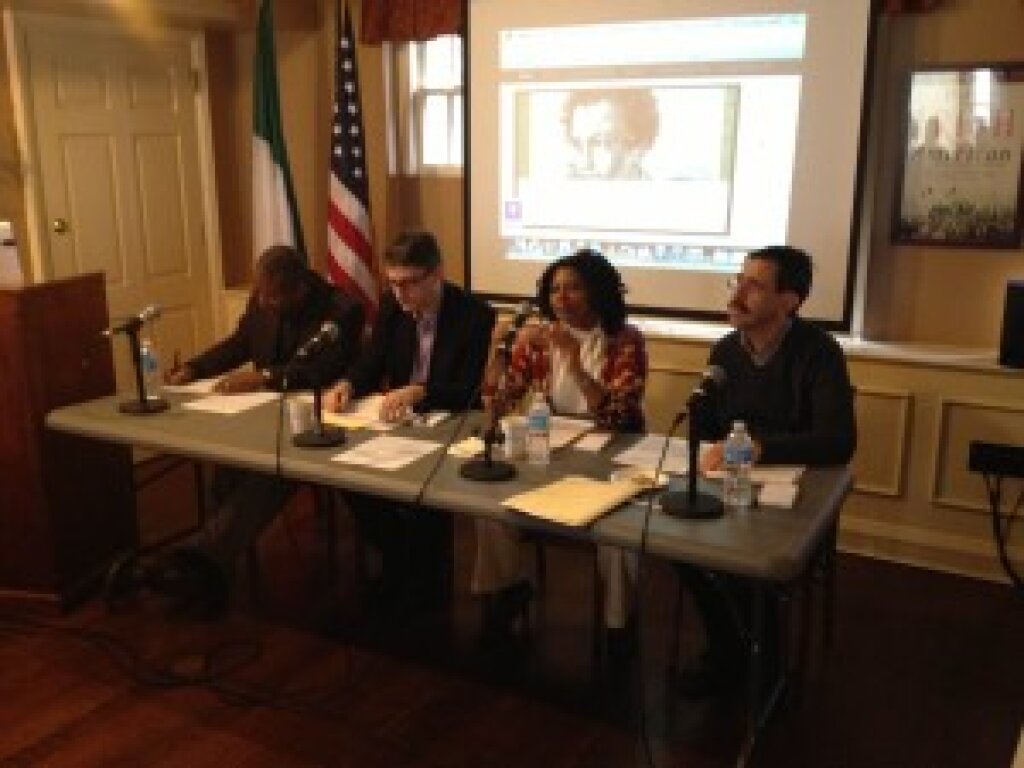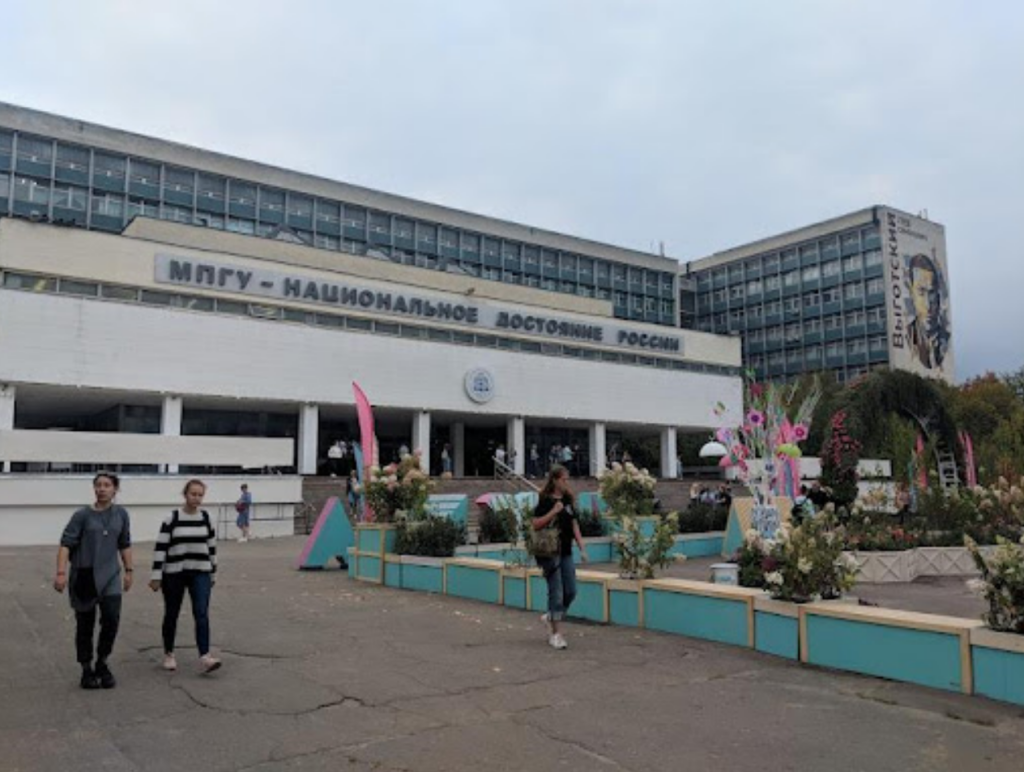Hasia Diner, Nathaniel Knight & John Waters.
It was a fascinating start to the Jordan Center’s Diasporas series which was held jointly with Glicksman Ireland House at NYU on 31 January – 1 February 2013.
For all the diversity of the papers and participants, covering Afro-Brazilian reenactments and Pushkin worshippers, Greek diner owners and would-be Russian imperialists, we tended to return to two axes of analysis. The first was the question of who has the right to decide: Who is Russian? And What Russianness do they carry with them as they move? The second is the matter of “checklists,” as our guest Kevin Kenny put it in his opening remarks, or the impulse to closely define something sociologically when it is really a matter of expression and performance. Too much definition kills it, too little makes it too general to be useful. Either way it would leave the Russian field where it started: the emigration and the Russian mob are more emotive and more precise than the diaspora could ever be. Or looking at human sex trafficking, as we will later in the term, there are real bodies at stake.
And yet the rubric of diaspora is now unavoidable and there are different stakes. Institutions from the Russian government seeking influence and a better image to myriad overseas cultural organizations, from the churches concerned with parishioners to the academic units seeking funds – all are taking diaspora seriously and using it with one or another purpose. What they all have in common, it seems to me, is that they are making a pitch while the concept is still fresh, claiming that Russians and Russianness are somehow coherent or should be; that all things Russian belong under the same intellectual or institutional or cultural umbrella; and that someone or something should or can tell Russians who they are.
Cheryl Sterling & Fred Cooper
Michael Gomez, whose name is so closely associated worldwide with diasporic studies, told us that there is always something at stake; that this is the time to direct and channel the discussion; and that the Jordan Center is well poised to do so. Now is the time to speak and speak we did, often in imaginative and inventive ways. As our Brazilianist-Africanist philologist Sheryl Sterling put it, drawing on her new book: claiming roots, even imagined roots, is not necessarily a bad thing and is hardly exceptional. Who are we to judge and who are we to say, as our very capable doctoral student Natalie Pierre asked and rightly so? (To which I humbly add: if we don’t make a case and if we don’t judge, someone else will.)
Nathaniel Knight, perhaps the leading authority on Russianness and Russian national identity, told us that Russians have always had multiple ways of viewing themselves (who doesn’t?), and in recent years the sense of loss has less to do with scattered Russians than lost empire, perhaps the most powerful among many possible sentiments. Mark Galeotti pointed out that the Russian mob was perhaps the most effective force in gathering the diaspora in New York – wealthy Russians and the Russian government were not filling the space – and the least likely to move on: where would the Russian mob be if it did not have a Russian community in which to embed itself? But these are stories of the mob and the lost empire, not a diaspora. Surely organized crime is more useful in our analysis, and surely we are back where we started.
Or would be had it not been for three interventions. Hasia Diner told us in much detail that a diaspora is always contested and used the example of Jews outside Israel who are told that Israel is the gold standard of Jewishness. It means that the Russian diaspora, too, will need to be fought over to decide what it is and who belongs. John Waters in his work on Irish writers (very bad ones, as far as the art goes) succeeded marvelously in creating a sense of Irish nationhood long before is was the vogue in Ireland itself. Might Russian abroad be funding and leading something similar in Russia because the options in Russian itself are fewer? And Fred Cooper, our indispensable Africanist, drew attention to the fact that the commercial and merchant diasporas have always been central to cultural movements as well. Wealthy Russians might buy professional sports teams but might they finance a Russian consolidation abroad in order to enrich the conversation at home? Russia needs many voices and many of them are not in Russia.
All this leads to the speaker who started us out on Thursday, Kevin Kenny of Boston College, whose name might not be especially Russian but who is writing a book about the idea of diasporas – a very short one, he repeated, but clearly the product of careful thought. A diaspora allows us to express and perform things that the nation-state might not. Yes, he recognized, diasporas are associated with certain concepts and emotions like uprootedness and loss and suffering, but he and others insisted that this should not be a checklist and it should not pre-determine what makes a diaspora and what is migration. Anything goes, in the sense that we should listen to our subjects and try hard to understand what they are trying to express. One may still ask about the political stakes, and Gomez reminded us that the diaspora on its own is too vague: it needs specific times and places to have grounding, and it needs to intersect with something else.
We’ll cover many of these matters later in the semester: the merchant diaspora that stretched from St. Petersburg to Istanbul; the spaces where movement and mobility are quite normal, like the USSR and the former Soviet space; human trafficking; the world of economic reform; the émigré communities that dreamed of return; notions of the environment and of animals that were shared across the socialist bloc; and of course food that travels across borders so well and will be the happy to conclusion to many of our sessions.




